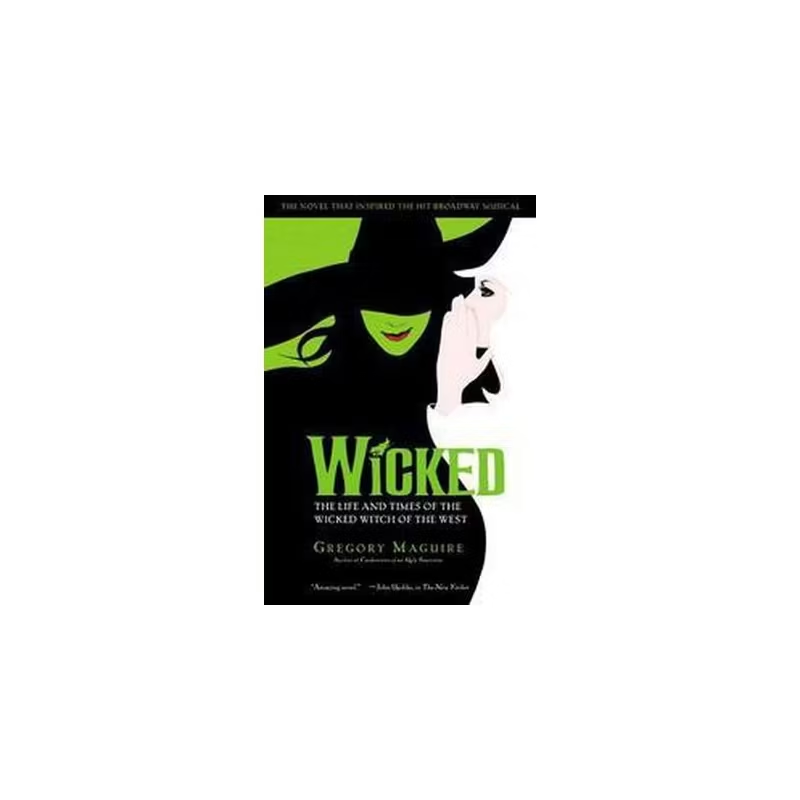“Wicked” Book Review
Book Review: Wicked: The Life and Times of the Wicked Witch of the West
by Gregory Maguire
Gregory Maguire’s Wicked: The Life and Times of the Wicked Witch of the West* is a spellbinding tale that reimagines one of literature’s most infamous villains. Published in 1995, this novel serves as a revisionist take on L. Frank Baum’s *The Wonderful Wizard of Oz*, providing readers with a complex and often sympathetic portrait of the Wicked Witch of the West, who is named Elphaba in Maguire’s narrative. Wicked is the first book in Maguire’s *The Wicked Years* series, which also includes *Son of a Witch* (2005), *A Lion Among Men* (2008), and *Out of Oz* (2011).
With its intricate world-building, morally ambiguous characters, and politically charged themes, *Wicked* transforms the simple fairy-tale setting of Oz into a rich, multi-layered landscape. Spanning 406 pages in its original edition, the novel explores issues of power, identity, and the nature of evil, making it both a fantasy epic and a sharp social commentary.
Summary of the Story
The novel opens with a retelling of Elphaba’s birth in the rural area of Munchkinland, where her green skin and sharp teeth immediately set her apart. Maguire presents her as an outsider from the very beginning, an image that will follow her throughout her life. Elphaba is born to Melena, a dissatisfied housewife, and Frex, a devoutly religious minister, both of whom grapple with feelings of alienation and disappointment over their peculiar child.
Elphaba’s journey takes her to Shiz University, where she befriends Glinda (the Good Witch) and begins to understand the political tensions gripping Oz. Maguire’s Oz is no utopia but a land of social inequality, oppression, and tyranny, ruled by the manipulative Wizard. These political realities awaken Elphaba’s sense of justice, turning her into a radical activist rather than the cackling villain of Baum’s tale.
As the novel progresses, Elphaba’s personal struggles intertwine with larger societal issues. Her tragic transformation into the Wicked Witch of the West is not the result of inherent malice but of systemic injustices, personal heartbreak, and the weight of misunderstood intentions. By the time Dorothy arrives in Oz, the reader has a completely different perspective on the events leading up to Elphaba’s death, making her fate all the more poignant.
Themes and Writing Style in Wicked
Maguire’s prose is lush and descriptive, immersing readers in the vibrant and often darkly surreal world of Oz. The novel delves into themes of morality, free will, and the complexity of good and evil. By telling the story from Elphaba’s perspective, Maguire questions the binary labels of “good” and “evil” that are so prevalent in traditional fairy tales.
The book also addresses timely social and political issues, such as discrimination, environmental destruction, and authoritarianism. Through the lens of Oz, Maguire critiques our own world, showing how power and propaganda can shape narratives and marginalize certain groups.
Comparison to Other Works
Gregory Maguire is known for his ability to take well-loved tales and flip them on their heads, often providing a darker, more introspective take on familiar stories. In addition to *The Wicked Years*, Maguire has written several other notable novels, including:
– Confessions of an Ugly Stepsister (1999): A retelling of *Cinderella* from the perspective of one of the stepsisters.
– Mirror Mirror (2003): A reimagining of the Snow White story set in Renaissance Italy.
– After Alice (2015): A companion novel to Lewis Carroll’s *Alice’s Adventures in Wonderland*, focusing on the characters left behind after Alice’s journey.
Maguire’s works are characterized by their complex characters, richly imagined settings, and thought-provoking themes. While his writing may not appeal to readers seeking straightforward retellings, fans of literary fiction and speculative reimaginings will find his stories deeply rewarding.
Interesting Facts About Wicked
1. Broadway Adaptation: *Wicked* inspired the Tony Award-winning Broadway musical of the same name, which debuted in 2003. The musical, however, significantly alters the tone and storyline of the book, opting for a more hopeful and upbeat interpretation of Elphaba’s life.
2. Cultural Impact: The novel has become a cultural phenomenon, cementing Elphaba as a symbol of misunderstood outsiders and anti-heroes.
3. Language and Politics: Maguire invented a unique slang and political structure for Oz, adding depth to the world-building. For example, the concept of “Animal” (sentient animals) rights plays a critical role in the story.
4. Illustrations: The original hardcover edition includes beautiful illustrations by Douglas Smith, which enhance the immersive experience of the novel.
Strengths and Weaknesses
One of Wicked’s greatest strengths is its ability to humanize a character who was previously seen as a caricature of evil. Elphaba’s struggles with her identity, morality, and relationships make her a deeply relatable and compelling protagonist. The novel’s exploration of the gray areas of morality is another highlight, challenging readers to question their assumptions about heroes and villains.
However, the book’s dense prose and philosophical tangents may not appeal to all readers. The narrative occasionally meanders, and some subplots feel underdeveloped. Additionally, the novel’s darker tone and complex political themes make it less accessible than the Broadway musical adaptation.
Rating and Conclusion
Overall, Wicked is a masterful reimagining of a classic tale, offering a fresh perspective on one of literature’s most iconic villains. Gregory Maguire’s ability to blend fantasy with social commentary makes the novel both entertaining and thought-provoking. While its dense prose and mature themes may not appeal to everyone, fans of literary fiction and complex world-building will find much to admire.
Rating: 4 out of 5 stars
The book loses one star for its occasional pacing issues and complexity, which might alienate some readers. However, its originality, depth, and emotional resonance make it a must-read for fans of speculative fiction and character-driven narratives. Wicked not only redefines the Wicked Witch but also challenges readers to rethink the very nature of storytelling itself.




